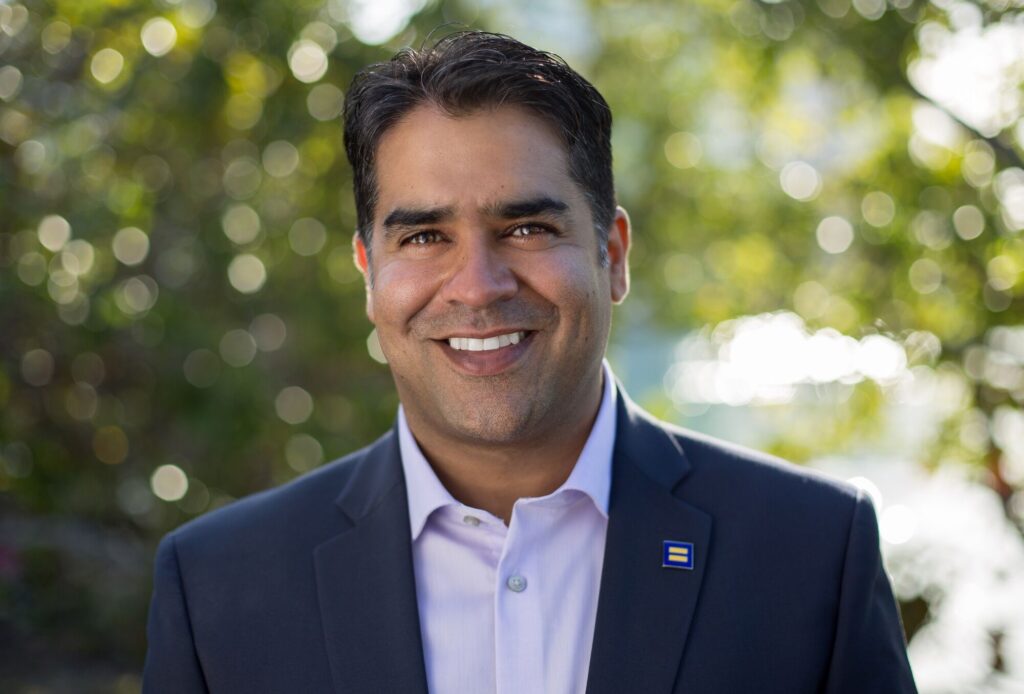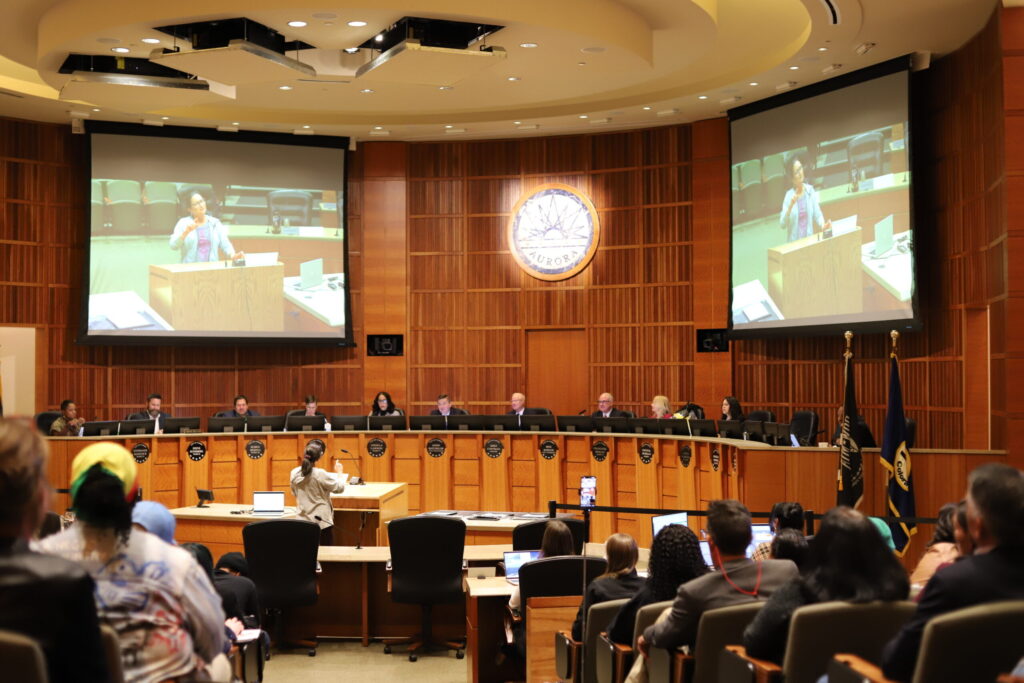Brown tells GOP donors to set aside abortion fights

Former U.S. Sen. Hank Brown – probably the closest thing the state GOP has to an elder statesman – urged a group of activist Republicans and major donors to the party to stop letting the divisive issue of abortion get in the way of electing Republicans. Speaking at a monthly fundraising luncheon thrown by the state GOP last Thursday, Brown told the group of about 100 that it was folly for federal candidates to draw sharp lines over abortion because, in the end, there’s not much they can do about it once in office.
“We’ve destroyed ourselves, in part, over an issue the person who gets the nomination doesn’t have anything to do with,” said Brown at a meeting of the state GOP’s Capitol Club at a downtown Denver restaurant. “It’s really quite extraordinary.”

Brown’s response was prompted by an audience member who asked whether state Republicans ought to “stop concentrating on social issues,” pointing to an exodus of some 60,000 GOP women who didn’t vote for Ken Buck, last year’s GOP U.S. Senate nominee, because of his views on abortion. “We only lost by 15,000 votes statewide,” the man said. “That’s what we’ve got to do.”
Brown prefaced his response by uttering a phrase that isn’t heard often anymore at state Republican gatherings: “I’m a bit suspect here because I’m pro-choice,” he said. “I don’t mean to suggest I like abortions – I don’t, I think they’re horrible, I wish none of them ever took place But I have real doubts about the extent you want government to control people’s lives.”
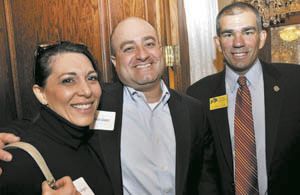
Noting that he suspected most of the Republicans in the room disagreed with him about that – and adding that “Colorado, as you know, is the second-most pro-choice in the nation” – he argued that the issue shouldn’t take center stage in elections because it’s out of the hands of politicians in Washington and just divides voters.
“The reality is, that’s a constitutional interpretation. The people you elect on that issue don’t have anything to do with that. You don’t vote on allowing or not allowing abortion in the U.S. Senate or the U.S. Congress. It’s never even an issue,” he said, adding that most Republicans agree the federal government shouldn’t subsidize abortions.
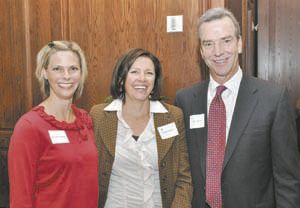
“So for Republican candidates, there isn’t any aspect of that pro-life, pro-choice issue that ever results in a vote in Congress,” he said, noting that in rare cases Senators can weigh in on the fitness of Supreme Court nominees and influence longer-term policy on abortion.
Another audience member asked why Democrats keep winning statewide offices, including the last three Senate elections. “We had a chance against either weak candidates or open seats, and yet we figure out a way not to win those seats despite the fact we have those benefits and the compelling economic argument you’re talking about,” he said.

“Most evidence suggests you can’t win it just by playing to the most conservative part of the party, you’ve got to bring independents, at least some of them, into your camp,” the Republican said and then asked Brown how to accomplish that.
“With one exception in the history of Colorado, the tallest candidate has always won for governor,” the statuesque Brown quipped. “It’s a fact.” Then, turning more serious, he said Republicans have to do a better job recruiting candidates, try to match the outside spending thrown at races by Democrats he repeatedly termed “billionaires who’ve inherited their money,” and deal with the reality that Colorado only has “one newspaper that is pretty one-sided.”

In addition, Brown said, “You have to understand that you have to support the candidate who wins the primary if he or she’s better than the Democrat, and I think that’s a challenge for us.” (Last summer, Brown was the first high-profile state Republican to pull his endorsement from GOP gubernatorial nominee Dan Maes, who went on to win just over 10 percent of the vote in a three-way race that saw Democrat John Hickenlooper trounce Maes and former U.S. Rep. Tom Tancredo, who ran on a third-party ticket.)
Still – even though Brown is one of the few Republicans with statewide prominence who still calls it the “Democratic Party” and not the “Democrat Party” – he drew sharp lines between the two parties and said there should be no confusion about which side is better for the country’s future.
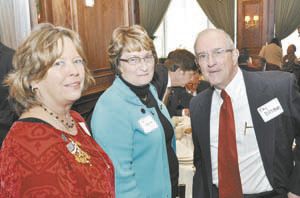
“Our friends that are Democrats are just as sincere in their beliefs as we are,” Brown said. “Admittedly, there is a difference in their structure because they are controlled by trial lawyers and controlled by the unions, and a few other special interests in a way Republicans never have been.” The difference, he said, isn’t in the shared aspirations for a better life, but in the results: “Every decade you increase the portion of the economy that’s spent on government, our rate of economic growth has dropped. When the portion controlled by government goes down, our rate of growth goes up.”
The choice, he said, is simple: “The Democrats aren’t going to be able to change. It’s not that they don’t want to change – it’s that they can’t. And they can’t because the reason they believe they get elected is they hand out money.” That way, he said, lies ruin.
“The reality is this nation faces the kind of future that Greece has, with chaos in the streets, with the destruction of our economy and our civil system, unless we face up to our problems,” Brown warned. “And the Democratic Party can’t do it.”
Brown was elected to one term in the U.S. Senate in 1990, following five terms representing northern Colorado’s 4th Congressional District. Before that, he served a term in the state Senate while he was an executive at Monfort of Colorado. After he left the Senate, Brown was president of the University of Northern Colorado and then ran things at the University of Colorado during the height of CU’s controversy over recruitment scandals and the Ward Churchill affair. Brown continues to teach political science at CU. Since 2008, he has been senior counsel at the Denver office of the law firm Brownstein Hyatt Farber Schreck. (Brown has been friends with two of the firm’s principles, Norman Brownstein and Steven Farber, since their undergraduate days at CU.) He and his wife, Nan, live in Denver.
– Ernest@coloradostatesman.com









